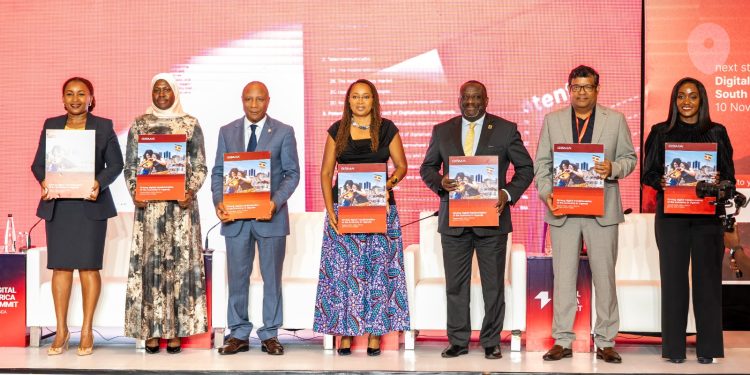Uganda could see a dramatic surge in digital connectivity, job creation, and economic growth by 2030 if the country implements targeted digital reforms, according to a new report unveiled today at the GSMA Digital Africa Summit Uganda held at the Sheraton Hotel in Kampala.
Titled Driving Digital Transformation of the Economy in Uganda – Opportunities, Policy Reforms and the Role of Mobile, the report highlights how strategic policy action could connect 4 million additional citizens to the internet, create 1.79 million new jobs, and generate UGX 14.6 trillion in added economic value. The report emphasises that collaborative efforts between government, regulators, and the private sector are essential to achieving the inclusive digital economy envisioned in the National Development Plan IV (NDP IV) and the Digital Uganda Vision 2040 (DUV).
Digital Transformation
Speaking at the summit, Hon. Godfrey Baluku Kiime Kabbyanga, Minister of State for National Guidance, underscored the government’s commitment to fostering a conducive environment for digital growth.

“Our major role as government is to ensure a conducive environment where innovation and business can thrive. We do this by establishing sound regulatory frameworks, progressive policies, and strong digital infrastructure that reach every corner of the country,” Kabbyanga said.
He stressed the importance of peace and security as foundational to progress and highlighted government efforts to expand infrastructure through partnerships with telecom operators and initiatives like the Universal Service and Access Fund (USAF).
Kabbyanga also discussed affordability strategies, including potential tax reductions on devices, local manufacturing, and initiatives like EDM to increase household incomes.
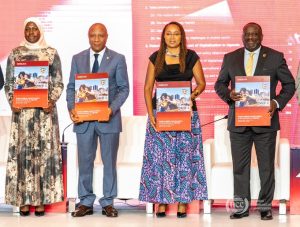
On emerging technologies, he said, “Government is establishing an AI Task Force to guide the country on how to approach the AI agenda responsibly. AI has the potential to make business and service delivery more efficient, but it also introduces new risks that we must prepare to address.”
Digital Inclusion
George Nyombi Thembo, Executive Director of the Uganda Communications Commission (UCC), highlighted the private sector’s central role in Uganda’s connectivity revolution.
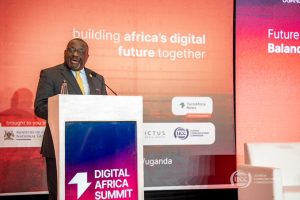
“Twenty-five years ago, we had fewer than 50,000 telephone lines. Today, we have over 40 million active subscribers, and practically every parish in the country can access a point to make a call. This represents enormous progress, driven primarily by the private sector,” Thembo said.
He said the sector now boasts of 34.6 million active mobile money subscriptions, 16.5 million mobile internet subscriptions and efficient spectrum management to improve quality of service and affordability.
He emphasised five pillars for bridging the digital usage gap: connectivity, content, digital literacy, devices, and innovation. “Affordability remains critical, and through programs like Parish Development Model (PDM), the government is helping raise incomes at the grassroots level, enabling people to prioritise ICT and digital services,” Thembo added.
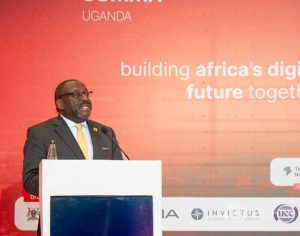
Inclusive Reforms
Speaking at the summit, Angela Wamola, Head of Africa, GSMA, stressed that Africa’s digital economy is already a major growth driver, but urgent reforms are needed to unlock its full potential in Uganda.
“Expanding coverage, growing digital skills, and boosting connectivity are key to advancing NDP IV objectives. The mission is clear: no one left behind. Every Ugandan, regardless of income or location, must benefit from digital transformation,” Wamola said.
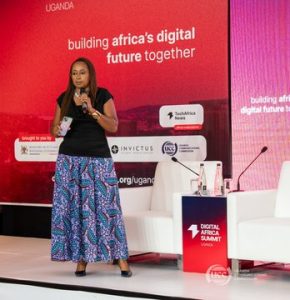
Policy Coherence
Aminah Zawedde, Permanent Secretary, Ministry of ICT & National Guidance, emphasised the government’s role in ensuring sector-wide policy alignment.
“We are reviewing the National Broadband Policy to align with emerging technologies such as 5G, AI, IoT, and cloud computing, ensuring that Uganda remains competitive in the regional and global digital economy. At the same time, we are investing in people through initiatives such as Digital Skilling Uganda, equipping youth, women, and persons with disabilities with the skills needed to innovate and thrive,” Zawedde said.
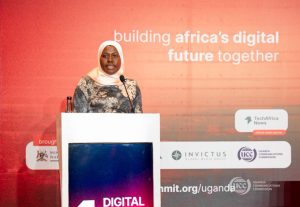
Private Sector Champions Digital Growth
Soumendra Sahu, Managing Director of Airtel Uganda, highlighted the role of access, content, and solutions in accelerating digital transformation.
“Greater smartphone access will accelerate Uganda’s digital transformation and participation in the global digital revolution. We are also investing in digital learning, financial inclusion, and sustainable operations to support inclusive growth,” Sahu said.

Sylvia Mulinge, MTN Uganda CEO, reaffirmed its commitment to bridging the digital usage gap. “Real progress happens when smart policy, right investment, and digital literacy move together. Accessibility requires affordable devices, and we aim for a day when an entry-level 4G smartphone could cost around US$20–30, a major milestone for digital inclusion.”
Uganda’s ICT industry is already robust, contributing 9% to national GDP, employing over 2.3 million citizens, and growing at an annual rate of 14.8%; this foundation supports achieving NDP IV 2030 goals of 70% national broadband coverage and 45% internet usage, with current GSMA data showing 96% 4G coverage and 11.46 million unique mobile internet users (22% of the population and 48% of adults).
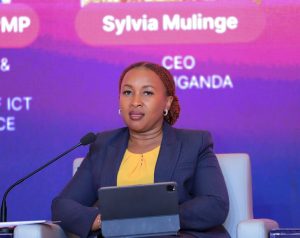
Despite this coverage, a significant usage gap exists, as three in four Ugandans within mobile broadband reach do not use it, primarily due to affordability barriers like the high cost of entry-level smartphones, sector taxes, limited digital skills, and an unreliable energy supply.
Way Forward
GSMA proposes five policy priorities for Uganda to empower citizens and grow the digital economy by 2030, including amending the National Telecom Operator license coverage obligation from 5 years to 20 years and designating telecom infrastructure as Critical National Infrastructure. The key fiscal reforms called for are the removal of the 12% excise duty on data services, ensuring mobile money transactions have parity with the 0.5% electronic transaction withdrawal levies, and exempting advanced telecom equipment (like 4G and 5G) from the 18% VAT on imported services.

Implementing these reforms could significantly benefit Uganda by 2030: extending 4G population coverage from 96% to 99% with an investment of only USD 10 million (compared to the current USD 550 million required), connecting an additional 4 million Ugandans to the internet to reach 19 million users in total (61% of adults), and creating 1.79 million new jobs. Furthermore, these measures are modelled to add UGX 14.6 trillion in economic value and deliver UGX 3.1 trillion in additional tax revenue from increased data usage, which would far outweigh the estimated UGX 370 billion loss from the proposed mobile tax reductions.
The Digital Africa Summit Uganda, organised by GSMA in partnership with the Ministry of ICT & National Guidance and UCC, brings together policymakers, private sector leaders, and key stakeholders to align priorities shaping Africa’s digital future.










